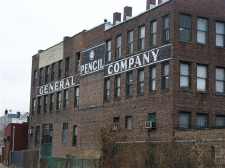There was a time when companies such as Colgate-Palmolive, Mueller Macaroni, Block Drug, and Lorillard Tobacco called Jersey City home, a time when production and shipping were handled under one roof.
But that is a long-past era, as these companies have either gone out of business or have been taken over by multinational conglomerates and have relocated. Sometimes products are made overseas to save labor costs and then sent to another location for packaging.
However, the General Pencil Company on Fleet Street is a lone holdout among today’s manufacturers. They have produced artists’ pencils, cosmetic pencils, and drawing kits since 1863, when they started in Hoboken as the American Lead Pencil Company. General Pencil has existed in same location since the early 1890s and continues to be run by members of the Weissenborn family.
In December, the company was acknowledged for their existence as a homegrown business based in New Jersey at an event at the State House in Trenton.
Recently, the CEO of General Pencil Company, James Weissenborn, talked about how his company has been able to survive in Jersey City against global competition. Still a family operation
Weissenborn, a native of Verona, N.J., is a sixth-generation family member running the company. His daughter, Katie Vanoncini, a senior vice president, is the seventh generation.
“I started in this business as soon as I was old enough to walk, helping out my father and seeing how pencils are made,” said Weissenborn.
After he graduated from college in 1965, Weissenborn went to California, where he worked as a sales rep for 15 years until he came back to New Jersey to help run the family business.
In the nearly 25 years since his return, Weissenborn has worked alongside his father, Oscar, until he retired, as well as his brother, Sandy, until he passed away seven years ago.
Weissenborn said that besides his daughter, his employees have been an extended family to him.
“There are people who have worked since they graduated from high school, and some of them now have their children working here,” said Weissenborn.
Weissenborn said that such a close-knit operation enables his company not to have the employee turnover situation that plagues most major businesses, and allows them to deal directly with local arts and crafts vendors and those overseas.
When asked why he would continue being involved in the family pencil business, he said that in these technologically overstimulated times, the world needs pencils.
“More people are becoming victims of ‘information overload,’ ” he said, “working so many more hours and dealing with so much more information as a result of the Internet. As a result, more are taking up the simple pleasures of drawing and writing, getting more in tune with the artistic side of themselves.”
He has expressed pride at pushing his company to modernize their operations, to keep up with their competitors.
General Pencil does much of its business not only stateside but also in countries such as Spain, Germany, and Australia. General Pencil also has an office in Redwood City, Calif., where much of the marketing is done. The grand tour
Weissenborn then gave a tour of the facility, demonstrating an operation that he describes as “vertical integration.”
In the basement, graphite in 50-pound bags is poured into “ball mills,” where it is ground into a fine powder.
The powder is mixed with water, and the resulting substance is transformed into patties. The patties dry out in a moisture closet before going through a process where the substance is whittled into thin strips.
On the floor above, the strips are sandwiched between two pieces of wood that will eventually become pencils. They proceed to the ground floor, where the shipping area is located.
The tour allowed Weissenborn to interact with an ethnically diverse workforce of nearly 70 employees (many of whom are from Jersey City), asking them why there was a flaw in a particular pencil or giving compliments on their work ethic.
Weissenborn said there’s warehouse space located across the street for other pencil-making and for employee parking.
But Weissenborn said that one of the secrets of staying in business is a different part of the operation, one located in a room near to the entrance to the building.
“This machine shop is what keeps me in business, Weissenborn said. “Here I can have parts made for machines that are nearly a hundred years old. Many of the companies that made these parts have gone out of business, but we’re still here.” Ricardo Kaulessar can be reached at rkaulessar@hudsonreporter.com
